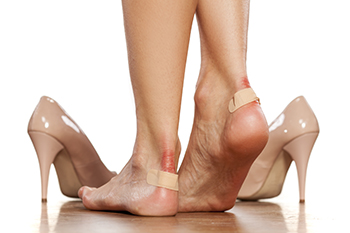
Foot blisters form when friction or pressure causes the outer layers of the skin to separate, leading to the formation of a small pocket of fluid. This often happens from wearing shoes that do not fit or from excessive walking or running, increasing the likelihood of skin irritation. Blisters act as the body’s natural defense, protecting the underlying skin while it heals. Wearing shoes that are too tight, damp socks, or having an irregular foot shape can increase the risk of blisters. While most blisters heal on their own, recurrent or painful blisters may signal an underlying issue. A podiatrist can prescribe custom orthotics or recommend footwear changes that can help to prevent further occurrences. For those with conditions like diabetes, a podiatrist’s guidance is especially important to prevent infections and ward off more serious complications. If you frequently have blisters on your feet, it is suggested that you schedule an appointment with a podiatrist to find out why.
Blisters may appear as a single bubble or in a cluster. They can cause a lot of pain and may be filled with pus, blood, or watery serum. If your feet are hurting, contact one of our podiatrists of ABC Podiatry. Our doctors can provide the care you need to keep you pain-free and on your feet.
Foot Blisters
Foot blisters are often the result of friction. This happens due to the constant rubbing from shoes, which can lead to pain.
What Are Foot Blisters?
A foot blister is a small fluid-filled pocket that forms on the upper-most layer of the skin. Blisters are filled with clear fluid and can lead to blood drainage or pus if the area becomes infected.
Symptoms
(Blister symptoms may vary depending on what is causing them)
- Bubble of skin filled with fluid
- Redness
- Moderate to severe pain
- Itching
Prevention & Treatment
In order to prevent blisters, you should be sure to wear comfortable shoes with socks that cushion your feet and absorb sweat. Breaking a blister open may increase your chances of developing an infection. However, if your blister breaks, you should wash the area with soap and water immediately and then apply a bandage to the affected area. If your blisters cause severe pain it is important that you call your podiatrist right away.
If you have any questions, please feel free to contact our office located in Columbus, OH . We offer the newest diagnostic and treatment technologies for all your foot care needs.




